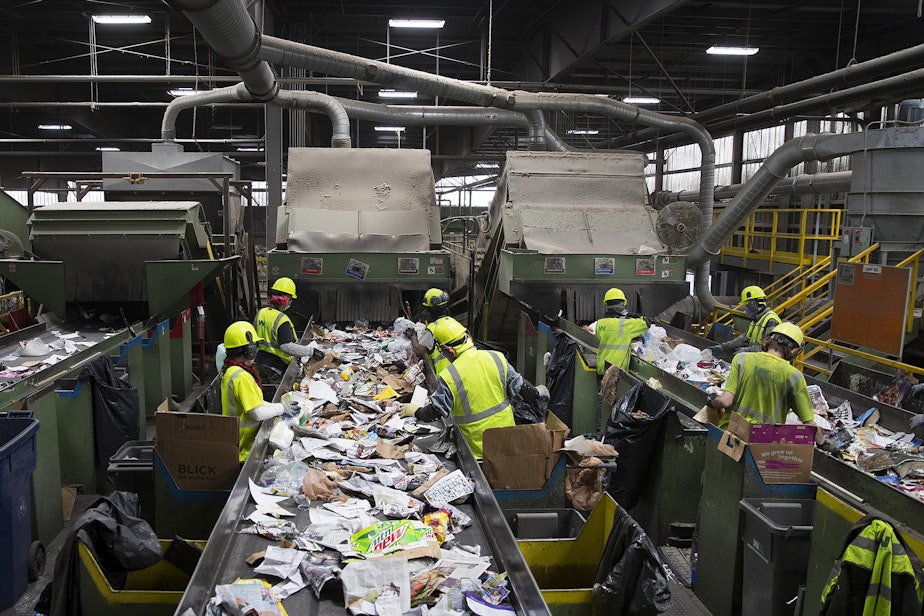Broken no more: Seattle's glass recycling is back in business

Glass recycling is back in Seattle after a nearly year-long hiatus.
Bottled-beverage drinkers kept putting their empties in recycling bins, but the recycling loop shattered after the region’s main manufacturer of glass bottles, Ardagh Glass Packaging in Seattle, shut its doors in 2024.
Seattle Public Utilities officials say they’re “thrilled” that newly completed rail work has enabled the city to tap into long-distance markets for its glass instead.
“It's not recycling until materials are actually used to make new products again,” said McKenna Morrigan with Seattle Public Utilities.
Until July 2024, when the Ardagh plant in Seattle’s Duwamish Valley shut down, much of the waste that Seattle-area residents and businesses put into their blue bins got turned into new bottles in Seattle.
Waste haulers took recyclables to a Republic Services sorting facility in the Sodo district. From there, glass bottles then went to a Strategic Materials sorting plant along the Duwamish River to be separated into brown, green, and clear glass and crushed. The main destination for that crushed glass was just next door, where the Ardagh plant made wine bottles.
Sponsored
After the Ardagh plant closed, thousands of tons of old bottles started to pile up in South Seattle warehouses.
“We kept operating and kept shipping material,” said Laura Hennemann with Sibelco, a global mining and recycling firm that purchased Strategic Materials, America’s largest glass recycler, in 2024. “It's just our largest local market was no longer there, so there was a void.”
RELATED: Seattle recycling faces 'unprecedented challenges' as bottle maker closes
“The challenge with glass is that it is heavy,” Morrigan said. “Transporting it over longer distances, especially by truck, can reduce the environmental benefits and also increase the costs of recycling.”
After Seattle Public Utilities and its contractors ran out of storage space, Morrigan said they sent some glass to a landfill.
Sponsored
“Fortunately, that was a pretty brief period of time,” Morrigan said.
On Monday, Seattle Public Utilities announced that railroad improvements have enabled the Sibelco plant to tap into markets in western states, enabling Seattle’s old bottles to be made into new bottles again.
“We’re grateful Seattle residents continued recycling their glass throughout this pause,” Seattle Public Utilities head Andrew Lee said in a press release. “Their commitment is paying off as glass is once again flowing to intended end markets in the recycling chain.”
The city of Tacoma stopped accepting glass for recycling in September and sent glass to the landfill through January, when it announced it was sending its glass to Portland to be made into new bottles.
Sibelco’s Seattle plant is now shipping crushed glass to manufacturers of bottles and fiberglass in undisclosed western states.
Sponsored
Recycling officials declined to say where the glass is heading now or what rail improvements were made.
“We can't share our actual customer list or markets,” Hennemann said.
O-I Glass has bottle manufacturing plants in Kalama and Portland, while Gallo operates the nation’s largest bottle manufacturing plant in Modesto, California.
Bottles remain the leading product made from glass from Sibelco’s South Seattle sorting plant, with fiberglass a close second. Other products such as reflective highway beads and lightweight concrete make up small shares, according to Hennemann.
The Seattle plant handles glass bottles from Oregon, Washington, and Canada.
Sponsored
“Glass, plastic bottles, and aluminum cans are all highly recyclable materials, and they absolutely can and will get made into new containers if they're recycled through our programs,” Morrigan said.
Every ton of glass recycled prevents the mining of 1,300 pounds of sand, 410 pounds of soda ash, 380 pounds of limestone, and 160 pounds of feldspar used to make new glass, according to the Glass Packaging Institute.
Recycling also saves some of the energy needed to turn sand into glass, though transporting and melting down old glass is not without its own impacts.
Before it closed, the Ardagh glass plant had been one of the Duwamish Valley’s worst polluters, with multiple violations of clean-air and clean-water laws, especially for emissions of heavy metals.
In Portland, the O-I Glass plant has had a decade-long pattern of violating air pollution laws, according to the Oregon Department of Environmental Quality, which fined the plant $214,000 in 2023.
Sponsored
Morrigan said reusing containers is better environmentally than recycling them.
“The best thing is on draft, right?” she said. “We also really encourage folks to refill and repurpose containers, so that you can reduce the number of containers that you're using overall.”
RELATED: California sues ExxonMobil for misleading public on plastic recycling
“What's the highest and best use? It's probably refillables, but we're in the recycling business, so refillables don't always make sense,” Hennemann said.
According to the Environmental Protection Agency, Americans throw away 12 million tons of glass annually, with about a third of it being recycled into other products.
An estimated 40% of glass gets recycled in Washington. The Washington Department of Ecology expects that rate to rise with the state’s new recycling law that requires packaging producers to finance statewide programs to reduce waste from their products.




